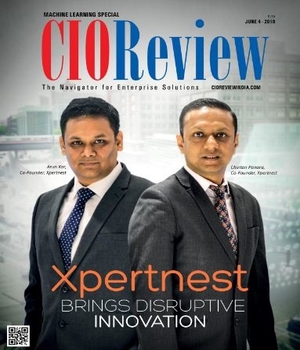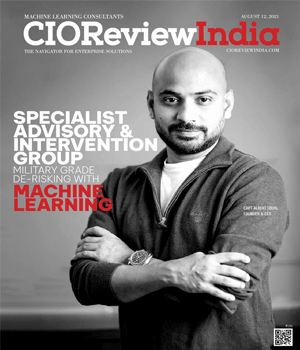
Machine Learning: The Acquired Intelligence
By Sudhakar Singh, Editor | Friday, 26 March 2021, 14:33 IST

In business scenarios wherein the norm has hitherto been to set up a particular workflow and stick to it no matter how it responds to advent of unforeseen events, machine learning has emerged as a boon, enabling a change of tack according to the new information that comes to light. The deep learning ability of the system to learn on its own can render the much needed confidence among decision makers to tread the path of business goals, ascertained of the fact that workflow has not become redundant. This has emerged as the next level beyond supervised learning, making its efficacy lauded in every sector from e-commerce to medical diagnostic systems. Owing to its rising applications, the global machine learning market is showing growth signs that can catapult it to achieve a worth of more than $30 billion by 2024.
If we look at the current trends in machine learning, there are several advancements that are turning heads. Let us zero in on the most important ones that are creating a buzz.
Augmented Analytics
Data analytics is getting a renewed power from the usage of AI/ML. By integrating AI/ML in data analytics, business analysts are able to be one step ahead in terms of collecting data, structuring it and making sense of it. AI/ML gives another dimension to the ability of data science in identifying information and extracting insights from it. It brings in an element of automation that enables businesses to focus on the decision making pertaining to their core competency. Combined with Natural Language Processing (NLP), machine learning makes it possible to understand and analyze data the way humans would do.
“Small and wide data approaches provide robust analytics and AI, while reducing organizations’ large data set dependency. Using wide data, organizations attain a richer, more complete situational awareness or 360-degree view, enabling them to apply analytics for better decision making,” says Rita Sallam, Research Vice President, Gartner.
Machine Learning in Cyber Security
Attacks such as WannaCry are a proof that no business can have a security team that is omniscient of any future attacks. Under these circumstances, the least that can be done is to not repeat the mistakes. By using machine learning, the system can be made capable of adjusting its future actions to an event based on the insights gathered from past data patterns.
Machine learning can also make the system capable of sifting through a plethora of files and identifying the potentially harmful ones in order to eradicate them or secure them. It is all about getting better at the game of probability by identifying the patterns.
“More banks and financial institutions are waking up to the benefits of a risk-based approach to fighting financial crime. Powered by AI and machine learning, this approach paints more accurate pictures of each customer, based on thousands of contextual customer decisions, transactions, and connections,” says Theresa Bercich, Principal Data Scientist, Lucinity in an article for International Banker.
Combination of ML and IoT
When it comes to leveraging data for insights, what can be a better source than IoT sensors? With their increasing adoption across industries and in consumer segment as well, IoT sensors are throwing up humongous data that can be used for preemptive action or corrective measures. Combined with machine learning, IoT is going to become the pool of information which can steer the course of remedial or preventive action. For instance, an aircraft can be having a multitude of IoT sensors that are sending data to the cloud. That data can be analyzed by the machine learning system to predict the failure of any component of the aircraft.
Although the current trends in machine learning seem enticing, there are several stumbling blocks in the way to its large scale adoption which would have to be turned into stepping stones to reach the goal. Let us look at some of the major challenges that are impeding the large scale implementation of machine learning.
Quality of Data
Having incorrect data can result in wrong interpretations. If some values and missing and the data analysis is done regardless of the fact, the prediction is bound to be incorrect. So, it is important to ensure that the data collated is correct and in case there are some missing values, it needs to be factored in during analysis. Data processing should be done by filtering missing values and then extracting and rearranging what the model requires. Given the fact that ML algorithms learn by assessing large amounts of training data, even small errors in training data can result in considerable errors in system’s output.
Infrastructure Requirements for Testing
For data modeling and reusability, a proper infrastructure is required which is currently missing in most of the cases. For the testing of different tools, the infrastructure is important and only through frequent testing can one arrive at desired outcomes. This is true in all cases, which is why companies which lack the appropriate infrastructure approach several firms to model their data. The results can then be compared and the best one can be adopted. ML workloads have special infrastructure requirements that are needed in periodic bouts of training. Edge devices are being used today to test the models for accuracy and performance.
“Startups tend to be constrained with not all the right resources to implement a quality data pipeline and consistently managing it over time. Enterprises usually have scale on their side and with that comes the rigor that is required,” says Jeff DeVerter, CTO of Rackspace Technology to TechTalks.
Dearth of Talent
Lack of skilled resources is another challenge that the segment is facing. We are seeing a number of talented data scientists in the market but as they are in most cases not proficient in software engineering, they do not fit into the role of the ideal candidate. A professional with command in both machine learning concepts as well as software engineering is what the market is seeking currently. The skills gap has also led to an exponential rise in the remuneration of those few who are capable. As companies expedite their AI ventures and implementations, the supply of talent is yet to catch up with the demand.
“Today, data science is out of reach for most business users. Business analysts have relied on data scientists to extract powerful, precise insights using sophisticated models. But getting to those insights can be complex, expensive and time consuming,” says Chandana Gopal, Research Director, Future of Intelligence, IDC.
Austere Business Models
Most of the new technology implementations require very minimal or absolutely no change in the business model, working as an add-on capability. However, in the case of machine learning, an enterprise must be willing to alter its business model if it wishes to derive maximum return from the implementation. Agility is integral to machine learning ecosystem as it is essentially dedicated to self-improvement. Any ML solution implementation does not guarantee success but shows the way towards it. Hence, business processes must be nimble enough to rethink and evolve in case the implementation does not work out.
True to its potential, the machine learning segment is attracting more and more startups that are spawning in this field to offer something unique. An aggressive approach is being followed across the industries where its use cases are emerging. Going forward, it would be interesting to see how it evolves further and gets interwoven into the fabric of enterprise.
CIO Viewpoint
Business Analytics: Bringing new dynamics in...
By Karan Doshi, Head - IT & Strategy, Nilkamal Limited
By Vineet Bhardwaj, Head IT, Godrej Properties Limited
How AI Can Drive Socio-economic Transformation
By Sourabh Tiwari, CIO, Overseas Infrastructure Alliance (India) Pvt. Ltd
CXO Insights
By Anjani Kommisetti, Country Manager - India and SAARC, Raritan & ServerTech, brands of Legrand
Data Science and Machine Learning in FinTech
By Jainendra Kumar, Head of Global Delivery Center-India & Senior Director of Product Development Software, Diebold NixDorf
How Machine Learning is shaping the world









